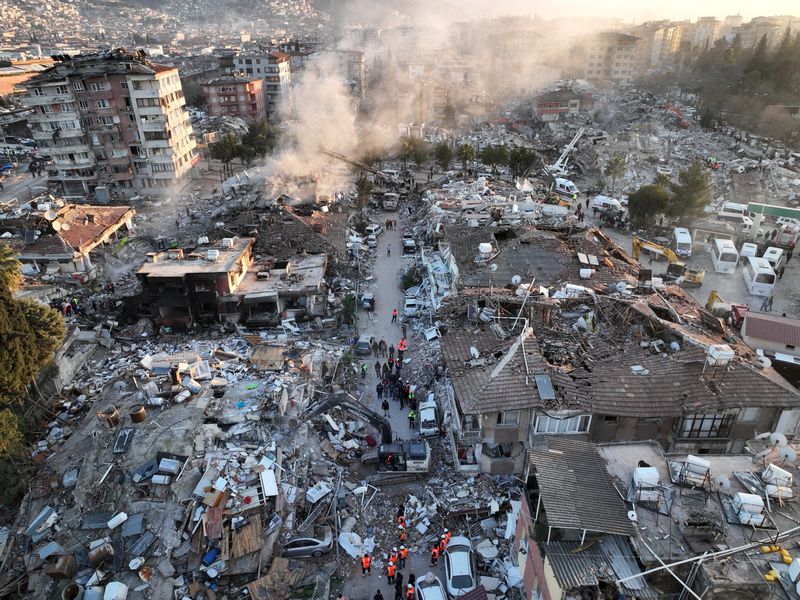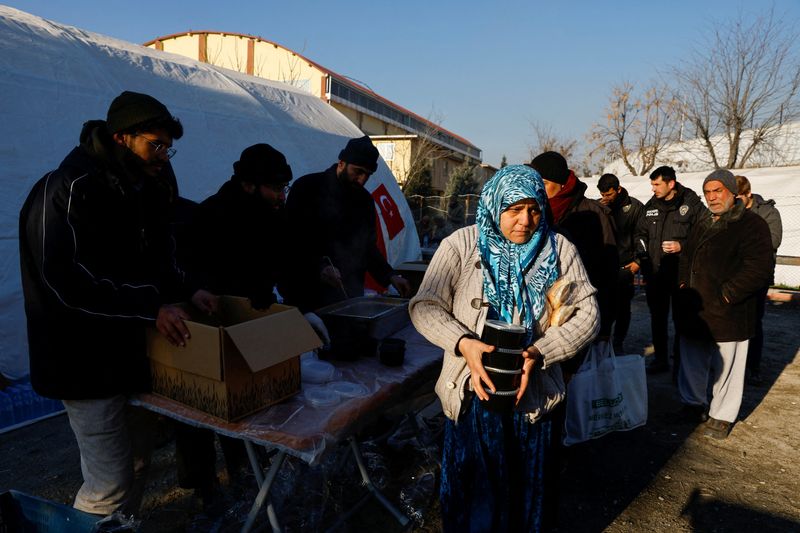By Henriette Chacar and Khalil Ashawi
KAHRAMANMARAS, Turkey/JANDARIS, Syria (Reuters) -Two women were pulled from the rubble in Turkey's southern city of Kahramanmaras and a mother and two children were rescued from the city of Antakya on Wednesday, as rescue efforts shifted to getting relief to survivors nine days after a deadly earthquake.
Rescuers could be seen applauding and embracing each other as an ambulance carried away a 74-year-old woman rescued in Kahramanmaras, and earlier in the day, a 46-year-old woman was rescued in the same city, close to the epicentre of the quake.
Later on Wednesday a woman named Ela and her children Meysam and Ali were pulled from the rubble of an apartment block in Antakya, 228 hours after the earthquake, state-owned Anadolu news agency reported.
The combined death toll in Turkey and Syria has climbed to more than 41,000, and millions are in need of humanitarian aid, with many survivors having been left homeless in near-freezing winter temperatures. Rescues are now few and far between.
Focus has shifted to supporting survivors and with much of the region's sanitation infrastructure damaged or rendered inoperable by the earthquakes, health authorities face a daunting task in trying to ensure that people now remain disease-free.
The World Health Organization (WHO) said on Wednesday it was particularly concerned by the welfare of people in northwestern Syria, a rebel-held region with little access to aid. It asked Syrian President Bashar al-Assad to open more border crossing points with Turkey to allow aid to get through.
The stories of how people survived for days buried under the rubble also began to emerge.
Huseyin Berber, a 62-year-old diabetic, survived 187 hours after the collapsing walls of his groundfloor were propped up by a fridge and a cabinet, leaving him an armchair to sit in and a rug to keep him warm.
He had a single bottle of water, and when that ran out, drank his own urine, he said from a bed in Mersin City Hospital.
"I shouted, shouted and shouted. No one was hearing me. I shouted so much that my throat hurt... Someone reached their hand out and it met with my hand. They pulled me out from there. The hole I got out from was very small. That scared me a bit."
In Kahramanmaras, homeless families slept in tents set up on the field and running track of the city's stadium.
In one tent, 28-year-old Hatice Kavakdali clutched a grey teddy bear.
"I can't put the experience we had into words. It was so terrifying and I am still feeling the pain of that," she said. "I lost consciousness after the quake and I am still recovering. I couldn't remember my family or how we got out of the house."
Others worried about the lack of sanitation.
"We haven't been able to rinse off since the earthquake," said Mohammad Emin, a 21-year-old graphic design student.
Batyr Berdyklychev, the World Health Organization's representative in Turkey, has warned that the water shortage in quake-hit areas "increases the risk of waterborne diseases and outbreaks of communicable diseases."
On a ferry being used to treat survivors in Turkey's southern port of Iskenderun, pharmacist Jin Ozsaygili also worried about health risks.
"We expect cholera and typhoid epidemics. In order to prevent these diseases, the debris should urgently be removed."
Meanwhile, the government encouraged people to go back home, if and when authorities have deemed their building safe.
"We will quickly demolish what needs to be demolished and build safe houses," Turkey's Environment and Urbanisation Minister Murat Kurum tweeted.
'REALLY TRAGIC'
Across the border, in Syria, relief efforts have been hampered by a civil war that has splintered the country and divided regional and global powers.
"It's clear that the zone of greatest concern at the moment is the area of northwestern Syria," Mike Ryan, executive director of the WHO's Health Emergencies Programme, told a briefing in Geneva.
"The impact of the earthquake in areas of Syria controlled by the government is significant, but the services are there and there is access to those people."
Civil war hostilities have obstructed at least two attempts to send aid to the northwest from elsewhere in Syria, but an aid convoy reached the area overnight.
Organised by Arab tribes, trucks loaded with blankets, food, medical supplies and tents arrived overnight in the insurgent-held rebel northwest from a region controlled by the Kurdish-led Syrian Democratic Forces, a Reuters reporter said.
"The situation is really tragic," Abdulrahman Mohammad, a displaced Syrian originally from the neighbouring province of Aleppo, said in Idlib, where many had found refuge in the past decade from other war-torn provinces.
Parts of the provinces of Idlib and adjacent Aleppo held by Turkey-backed rebels suffered the bulk of the quake's casualties in Syria: over 4,400 of a death toll of more than 5,800, according to the United Nations and government authorities.
Some had lucky escapes.
In Syria's Mediterranean town of Jableh, Um Kanan recounted how she woke her three children and rushed them to a small closet in her bedroom for shelter.

The force of the quake brought their fourth floor apartment crashing to the ground, but the four survived.
"I kept thinking to myself: 'Can it be? Did the building just fall down? Is this a dream?' I tried to move but I couldn't," she said. "The children and I, by some miracle, we ended up in this small space that I had left empty."
